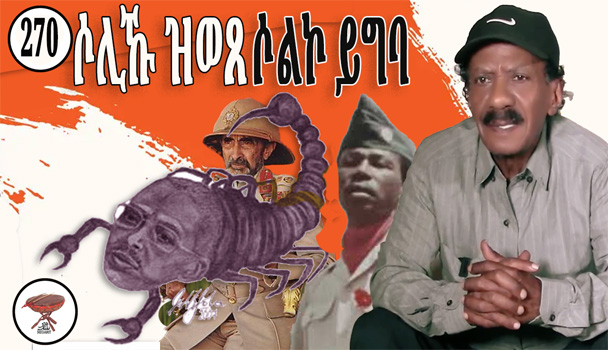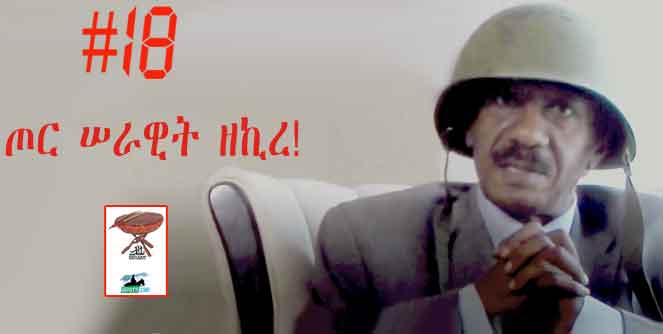Yemane Gebreab And Associates
anyone who sneaked out can sneak in
I do not know much about soccer, but I gather most Eritreans support either Arsenal or Chelsea. I know about that from Bakri Humed’s YouTube channel. Please remember I am bringing the teams as an example, because we often say our discourse has become akin to fans rooting for their favorite teams. But most fans are not even close to the hooligans I have in mind—my apologies in advance.
In English, Chelsea originates from an old word meaning wharves where chalk is offloaded—we call it, limestone. And Arsenal means the storage of military wares, or the wares themselves. For example, when individuals have a barrage of insults in their vocabulary, we say they have an arsenal of insults; they are the most annoying.
Psychologists and sociologists have not provided us with an explanation about why our racists behave the way they do. Therefore, I will volunteer to explain their behavior as an observer. I believe it’s depression. And I think I have observed them enough to believe they are depressed individuals. Dealing with a depressed person is a burden—they are so sad and are not sure of what they want. If it’s cold, they complain. If it’s hot, they complain. If it is noisy, calm, busy, or quiet, they just complain. That behavior is reflected in their political and national positions. Their views are unstable, unpredictable, and confusing.
Masonry was the hobby of my great uncle.
My late uncle spent most of his spare time building, demolishing, and rebuilding walls and steps. He built walls only to demolish them a few months later—he thought the walls were either too high or not high enough. When he embarked on one of his DIY projects, he gathered the neighborhood’s children and asked us to fetch sand from a dry riverbed close by. Even the small children were excited for being part of the sand hauling activity; they carried sand in small cans—it adds up.
When we walked to the riverbed, he watched us as a supervisor, shouting instructions: “Why are you lazy! Walk faster!” We walk faster until he shouts, “Slow down, you might fall and hurt yourself.” His contradictory instructions changed in seconds.
Today, the hypocritical PFDJ supporters shout, “Zip! You talk too much; is that the only thing you are capable of?” Then some outraged people hear that and decide to throw stones instead. The hypocrites don’t like that either: “You terrorists! Now you are throwing stones!”
Most Eritreans are bewildered: are they for the wronged Eritreans to talk in a civilized manner or to be violent and throw stones? They can’t make up their minds. However, they are in the business of belittling dialogue and exposing their hypocrisy.
I think that is the behavior of depressed people; nothing satisfies them. But some people cannot take injustice silently; they refuse to conform and join the weakling “Yes, sir” crowd.
Bigots only know to use bigoted insults—isn’t that the reason they are called bigots! Yet, the Bible says, “In the beginning, there was the word…” They memorize that but do not understand it.
If there were no word, what was the use of God’s messengers? Like most prophets, the arsenal of Jesus was the power of words! With words, he preached morality, ethics, and virtuousness. Why do bigots go to churches and mosques? Is there anything else but words—mainly listening to sermons (words) and praying to God (in words), either quietly or loudly?
If something hits you, you cry ayyyy, to express pain or discomfort (in words). I think campaigning against words (freedom of expression) is nothing but encouraging violence.
Depressed people do not mind taking everything silently, submitting, and accepting humiliation. But that is against the principles of freedom. Only unjust systems deny the people the freedom of expression; unfortunately, the meek accept that. Thousands of Eritreans are languishing in prison without charge and without a day in court (there are no courts that defend the rule of law). If the unjustly imprisoned were allowed to defend themselves, they would need words, either in a sham court or at the public conscience court. The wishy-washy, opportunists, and unprincipled people are an impediment to normalcy and national reconciliation. And I will mention one among those who must take the blame.
Yemane Gebreab
I have a strong feeling that a few leaders of the PFDJ are responsible for the disarray among Eritreans, inside Eritrea, or in the Diaspora. Yemane’s exact position in the PFDJ hierarchy is not defined clearly; he has many hats. But he is one of the culprits behind the Agazian nuisance—a racist group that has been provoking and wreaking havoc among Eritreans. Yemane might have thought of using them because of some stupid ideology or mischievously for agitating purposes to tighten his partisan monopolistic grip. I am not imagining that. Some elements of the group have stated publicly that they were trained by him. And I have mentioned that several times; neither Yemane nor the PFDJ party in which he is a senior leader have denied the allegations. Well, I surmised there must be some truth to that, and until I see a credible rebuttal by Yamane or his party, that will be my conviction. But thanks to caring patriots, the bigoted crowd is already defeated, if not fully dismantled.
The Nuovo Wedo Geba (the surrendering)
Since a year or so ago, several depressed people left their conscience behind and surrendered to the PFDJ regime; many have already become additional mouthpieces for the regime. They shamelessly accuse the opposition to the PFDJ as if they made them surrender! I think it’s their depression that puts them in a confused state of mind.
As if they don’t own their decision, they think the opposition made them err—betray the PFDJ, which they equate to the nation. From inside Eritrea, they boast, “our country is great, see how beautiful the streets are!”
A bubble needs to deflate here: If you left your country because someone told you to do so, you are a dull, characterless person. If you concluded the opposition rhetoric was to hypnotize and convince you to leave your country, ask yourself why you didn’t think it over before you embarked on a journey aimlessly. But was it an aimless journey? Honesty is required.
Some were envious of those who left earlier and were doing well in the diaspora. Some were apprehensive; they didn’t get education and wanted to study. Some were poor and wanted to work and improve their livelihood. Some were chasing a girlfriend or a boyfriend. The self-centered had varied reasons for leaving. Why are you pointing fingers at imaginary people as if they made you leave Eritrea? Didn’t you leave on your own, and now surrender to the nearest embassy and return on your own?
The Gist Of The Message
Stop acting patriotic for submitting a “regret form” given to you by the government. Do you think it’s alright to ask for forgiveness to return to your own country. That means surrendering your freedom and thought that’s doable for some, it’s unthinkable for others. If you think you are the trailblazer, think of the thousands who surrendered to the government during the struggle era, probably before you were born. They also claimed the freedom fighters made them err and betray the occupying Ethiopian government. Who is that abstractly defined entity that made you take whatever decision you took?
Truth be said, except for those who left Eritrea when their villages were burned down or razed to the ground, those who have lived in desolate refugee camps in the Sudan, the rest are personal decisions. Some of the new immigrants in the diaspora left their country to acquire citizenship in greener pastures, accumulate money, or go to school. Maybe they failed to achieve any of the goals they dreamed of. Taking a selfie in a street in Eritrea, or boasting that you met your relatives, is good, but don’t make it sound as if you registered a goal on Arsenal’s or Chelsea’s goalpost.
Don’t think you stand on higher moral ground to boast about how beautiful you think Eritrea is, which you probably discovered after your surrender.
There are thousands who earned that right, most knew how beautiful Eritrea is and they still long for it; they are virtually living inside it from afar. When you position yourself as if you stayed out for valid reasons, were afraid of retribution by the government, or were driven by principles, please say what you did for the public good that annoyed the regime, you were targeted and had to leave?
A little more deflating of the overly inflated balloon: According to the PFDJ, your crime is you left through the borders illegally without a license to do so from the regime; you abandoned your units, or you avoided the Sawa conscription.
Maybe you left for financial or other reasons; the opposition has no role in that. Why blame the opposition? The government that you are now polishing and yourselves are responsible for your ordeal. Deal with it. There is a Tigrinya saying, “zeHmeqo alleni betrey habun aytgberuwo” (I see someone I can defeat, get me my baton). At least be honest, have some integrity.
Your mediocre propaganda is pathetic, trying to portray yourselves as courageous. Have respect and address public issues if you can.
I can tell some of you feel warm in the PFDJ’s bosom. Good for you. But don’t make that a reason for provoking others with your unprincipled positions. Stop widening the inter-Eritrean gaps and deepening the division. Maybe if you work towards healing the wounds, after correcting your selfish, mediocre positions, many might forgive you. If not, you will forever be remembered as wedogeba* (Those who willingly surrendered). You better learn from those who decided to return home without blaming others. Many have private reasons for wanting to return home, they visited, returned, and are going about with their lives without scapegoating others. Surrendering to the PFDJ is not a license to behave indecently. One cannot make an embarrassingly selfish decision and try to appear as a person with principles and integrity.





Awate Forum